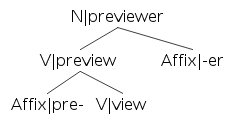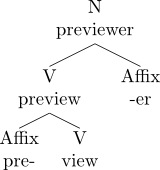Morphology resources
Section home -
Section policy -
Wordprocessing -
Back to E-Ching’s home
Phonetics - Phonology - Morphology - Syntax - Fun
Phonetics - Phonology - Morphology - Syntax - Fun
Mentioned in lecture
- The Oxford English Dictionary was originally intended more as a historical dictionary than a description of modern use, so it’s excellent on word histories — just click on (Show More) under Etymology. You may be interested in the entries for raspberry and strawberry; I found the entry for cranberry rather unsatisfying.
Wordprocessing for morphology
Trees. Most tree-drawing tools are designed for syntax, but there are ways to adapt them for morphology.
- I recommend phpSyntaxTree, a free website which generates trees as images. You type your tree as bracketed structures, e.g. [preview [pre-] [view]]. Most people find it easier to start small and add one layer of parentheses around the outside each time. Save the bracketed form somewhere in case you need to change your tree later.
- LaTeX Previewer can do line breaks, but it takes more work to get the image into Word. First, click on the Packages button and move qtree from Available to Included. Now you can type trees using bracketed structures like \Tree [.V\\preview Affix\\pre- V\\view ] . To see the results, click Preview.
- Alert! Every closing bracket needs a space before it.
- The same advice about starting small and saving code holds.
- You can have more than one tree in the window. Just separate them by an empty line.
- The easiest way to get this into Word is probably to click Download, choose PDF format, then select and copy it in Acrobat.
This website doesn’t do line breaks, so I’ll accept slightly unorthodox trees. For this tree the code was [N|previewer [V|preview [Affix|pre-] [V|view]] [Affix|-er]] . I also changed the settings to font size 12, no color, no auto subscript, no triangles.
For this tree the code was \Tree [.N\\previewer [.V\\preview Affix\\pre- V\\view ] Affix\\-er ] .
Other resources
- The Leipzig Glossing Rules describe common conventions used in glossing, e.g. the English word is would be glossed as be-3sg. Advanced students might want to skip straight to the appendix of abbreviations at the end.
- The International Olympiads in Linguistics are like a survey of Intro to Linguistics in brainteaser form, with a strong focus on morphology. Everyone’s favorite from IOL 1 is Problem 1 on Transcendental Algebra, a.k.a. mathematics meets dingbats.
Any suggestions for other links?

